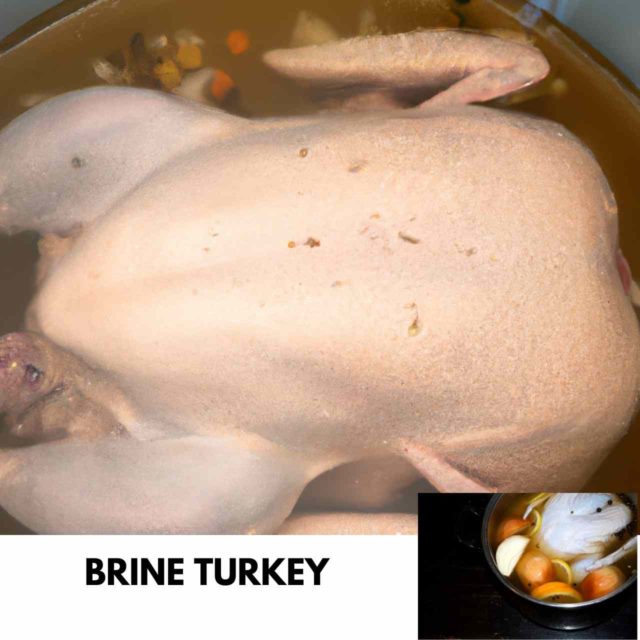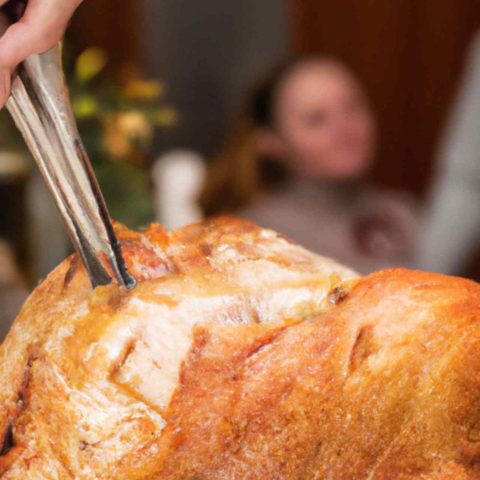How to Make a Moist and Tender Turkey Through Brining
Turkey is a classic holiday dish, but it can be tough to get right. A dry, overcooked turkey is no one’s idea of a good time. Luckily, there’s a simple solution: brining, sometimes called wet brine.
Brining can be compared in some aspects to curing bacon or dry cured pepperoni where a preservation and tenderization process optimizes the meat.
If you’re looking for a way to guarantee a moist and tender turkey, brining is the way to go.
Brining is a process of soaking the turkey in a saltwater solution, which helps to keep it moist and juicy during cooking. It’s a simple process, but it can make all the difference in the final dish.
And if you are serving big portions of turkey per person at thanksgiving you want it to taste good. [See our online Turkey Calculator]
Here’s everything you need to know about brining a turkey.
What is Brining? And How Does it Works for Turkeys?
The process of brining is simple: submerge your turkey (or chicken, or pork chops) in a saltwater solution. This works because the water molecules actually break through the protein barriers in the muscle tissue, allowing them to bind to the meat and retain moisture.
At the same time, the salt helps to firm up the proteins in the meat so that they don’t break down as easily during cooking.
When cooking a turkey high in the mountains – how long?
The result is a bird that is juicier and more flavorful, with a texture that is more tender and moist. And best of all, it’s not at all difficult to do!

Why Brine a Turkey?
There are two main reasons to brine a turkey: to keep it moist and to add flavor. When you cook a turkey without brining, it’s common for the meat to be dry and overcooked. Placing the turkey on the correct oven rack is also important.
This is because the turkey loses moisture during cooking, leading to a less-than-ideal final product.
Brining helps to keep the turkey moist by absorbing water into the breast meat. This means that there’s less of a chance for the turkey to dry out during cooking. As a result, you’ll end up with a juicier, more flavorful final dish.
In addition to keeping the turkey moist, wet brining also adds flavor. When you soak the turkey in a saltwater solution, it absorbs some of the salt and seasoning. This means that your turkey will be more flavorful, both on the inside and the outside.
If you’re looking for a moist and flavorful turkey, brining is the way to go. It’s a simple process that can make all the difference in your final dish.
How to Brine Your Turkey
Brining a turkey is a simple process, but there are a few things to keep in mind. First, you’ll need to choose a brine solution. This can be as simple as salt water, or you can add additional flavors like herbs, spices, and citrus.
Once you’ve chosen your brine solution, it’s time to start soaking the raw turkey. For best results, soak the turkey for at least 12 hours, and up to 24 hours. This will give the turkey plenty of time to absorb the water and flavor from the brine.
When you’re ready to cook the turkey, remove it from the brine and pat it dry with paper towels. Then, cook the turkey according to your recipe.
Brining is a simple way to guarantee a moist and tender turkey. By soaking the turkey in a saltwater solution, you can help to keep it moist during cooking. In addition, the turkey will absorb some of the salt and flavor from the brine, resulting in a more flavorful final dish. So if you’re looking for a way to improve your holiday turkey, give brining a try.

Can You Brine All Kinds of Turkey?
Yes, you can brine all kinds of turkey. This includes fresh turkey, frozen turkey, and even store-bought turkey.
For best results, start with a clean turkey. If you’re using a frozen turkey, make sure to thaw it completely before brining.
Where to Brine Your Turkey
It is important to brine your turkey before cooking it, as this helps to keep it moist and flavorful. There are several ways to do this, depending on the size of your turkey and what you have available.
The USDA – has some safety information related to Brining
Using a Large Bowl or Container
If you have a small turkey, you can brine it in the refrigerator. Simply mix together the salt, water, and spices in a large bowl or container, then add the turkey and make sure it is fully submerged. Cover the container and leave it in the fridge for 12-24 hours.
Using a Food Grade Bucket
For a larger turkey, you will need a food-grade bucket. Again, mix together the salt, water, and spices, then add the turkey and make sure it is fully submerged. Cover the bucket and leave it in a cool, dark place for 12-24 hours.
Using an Ice Chest
If you don’t have a refrigerator or food-grade bucket, you can use an ice chest. Mix together the salt, water, and spices in a large bowl or container, then add the turkey and make sure it is fully submerged. Cover the container and place it in the ice chest. Fill the ice chest with ice, making sure that the turkey is completely surrounded. Leave it for 12-24 hours.
After the brining time is up, remove the turkey from the brine and rinse it off with cold water. Pat it dry with paper towels and then it is ready to cook.
How to Brine Your Turkey
The process is simple: you’ll need to make a salt and water solution and then submerge your turkey in it.
Mix the salt and sugar together in a large container. Add the cold water and stir until the salt and sugar have dissolved. Submerge your turkey in the brine, making sure that it is completely covered. Place the container in the fridge or another cool place.
How Long To Soak Your Turkey?
If you’re brining your turkey, you’ll want to soak it for 45 to 60 minutes per pound. This will help ensure that your turkey is juicy and flavorful. Just be sure to follow the instructions on your brine mix, as some may require longer or shorter soaking times.
What to Do When the Brining is Done?
After you’ve finished brining your turkey, there are a few things you’ll need to do before cooking it. First, remove the turkey from the brine and rinse it off with cold water. Then, pat the turkey dry with paper towels. Next, place the turkey on a roasting rack in a roasting pan and let it sit at room temperature for about an hour. This will help the turkey cook evenly.
Finally, when you’re ready to cook the juicy turkey, preheat your oven to the appropriate temperature and roast according to your recipe. And that’s it!
Easy Turkey Brine Recipe
Making your own curing salt brine turkey is simple and well worth the effort. It improves the meat tenderness and, in my opinion, makes the cooked turkey pair better with staple foods like thanksgiving roast potatoes.
Easy Turkey Brine Recipe
Equipment
- 1 Large Pot
Ingredients
- 1 cup salt
- 1 cup sugar Brown
- 1 gallon water
Instructions
- Combine the water, salt, sugar, and spices in a large pot or container
- Stir until the salt and sugar are dissolved.
- Add the turkey and make sure it is completely submerged in the brine.
- Cover and refrigerate for at least 12 hours, up to 24 hours.
- When ready to cook, remove the turkey from the brine and pat dry with paper towels.
- Proceed with your chosen recipe. Roasting, grilling, or smoking are all great options.
Does Brining Turkey Make It Tender
Brining a turkey certainly makes it juicer and tender, plus it improves the flavor.
How Long Should You Soak a Turkey in Brine
You should soak the turkey in brine for at least 8 hours. The longer you soak the turkey, the better. A common rule of thumb is an hour soaking per pound of turkey.
What Are the Pros and Cons of Dry Brining a Turkey Rather Than Wet Brining It?
The biggest pro of dry brining a bird is that it doesn’t require any additional water. Most turkeys are already naturally moist, so you don’t need to worry about adding too much moisture to the meat. However, there are still benefits to wet brining a turkey. First off, it adds flavor to the meat. Second, it keeps the meat juicy by keeping the internal temperature low. And third, it prevents bacteria growth. So, if you prefer to keep things natural, then dry brining is definitely worth trying. On the flip side, wet brining takes less time and requires less effort. Plus, it’s easy to add herbs and spices to the brine. All these factors mean that wet brining is a great option for anyone who wants to cook a turkey without having to deal with messy liquids.
